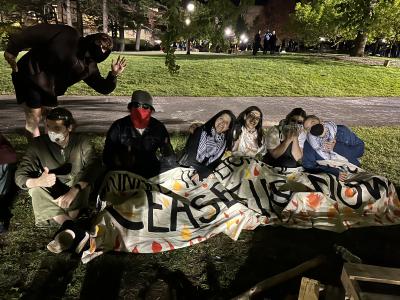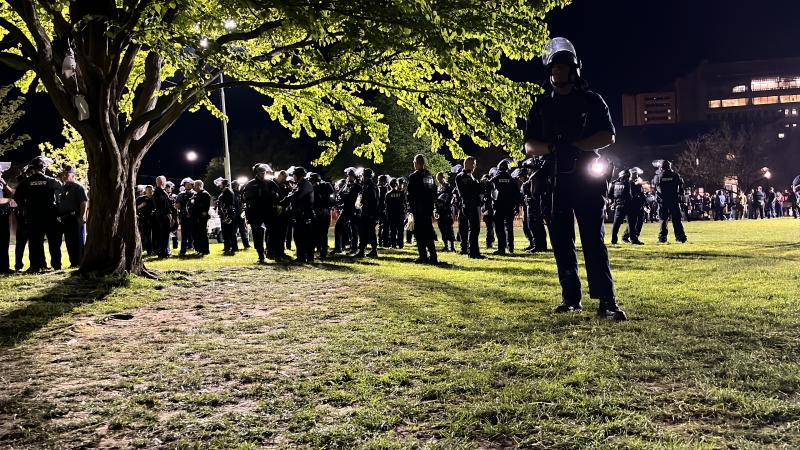Opinion: Who Are Universities For?

Leyla Moushbeck and friends at the protest on May 7, 2024. Photo: Leyla Moushabeck
The following column appeared previously in The Massachusetts Review. It is reposted here with the permission of the author.
Around midnight on May 7, 2024, I was arrested on the UMass campus alongside over 130 students, faculty and fellow community members. Up until the moment of my arrest, I’d been sitting on the ground, singing protest songs and sharing out granola bars with friends and colleagues, a “Ceasefire Now” banner draped across our legs.
I joined the student-led protest to pressure the UMass administration to disclose and divest from companies profiting from the sale of weapons used in the US-backed Israeli war on Palestine, an act that violates both US and international law.
I am a Palestinian American resident of Amherst, wife of a UMass alumnus, and co-owner of Interlink Publishing, which collaborates with and publishes numerous UMass professors’ works. As a resident of Amherst, my taxes subsidize the public land on which UMass resides. As such, I have a vested interest in and responsibility for how UMass chooses to invest its funds. As a friend to students who participate in our Interlink internship program, who share meals with my family, and who babysit my kids, I am concerned about their safety and well-being on campus. As a Palestinian American, I simply can’t afford to raise my children in a community that deems money more important than Arab lives.
Rather than enter into good-faith discussions with students, under the chancellorship of Javier Reyes the UMass administration opted to meet these peaceful, student-led protests with over 200 police officers in riot gear. This decision was paid for using state and municipal funds from six nearby towns, an expenditure that likely amounted to over $100,000. This happened at a time when the university is under federal investigation for anti-Palestinian racism. My local taxes paid for this action—as did yours.
May 7, 2024 marked seven months of Israel’s ever-escalating genocide against the Palestinian people, which has now expanded into Lebanon, Syria, and Yemen. That morning, Israel seized the Rafah crossing—blowing through President Biden’s so-called “red line” and cutting off the last remaining entry point for humanitarian aid to Palestinians in Gaza, during what UN officials had called “full-blown famine.” (Since then, ProPublica broke the story that US Secretary of State Antony Blinken covered up the US government reports that Israel is deliberately blocking aid.) This closure also dashed the hopes of family friends who, after being displaced by an explosion that killed 44 of their relatives, had just, finally, received the permits to cross into Egypt—a hope they have since abandoned. That day I could no longer find the strength to formulate yet another way to argue that my people deserve basic human rights, and I was grateful to be in community at the UMass’ encampment demonstration.
I joined this demonstration in the afternoon, where I witnessed teach-ins by faculty and heartfelt speeches outlining student demands. Students had set up a memorial to those killed—pictures, poems, and photos tied to string. Students and families with young children were sitting on picnic blankets. It was a calm scene, until the police arrived.
I stayed to bear witness, linking arms with staff and faculty to stand between students and the police. The administration’s response was clearly inconsistent with an encampment protest the previous year in the same place, which protested campus housing costs, not to mention the long history of UMass protests celebrated in photo displays on the walls of UMass’s Old Chapel.
As the evening progressed, I witnessed police in riot gear rip down the memorial and stomp on a picture of slaughtered Palestinian children in Gaza. By the most conservative estimates, there have been at least 16,920 children killed (and the esteemed medical journal the Lancet estimates this number could be three to fifteen times higher). I witnessed—as an officer threw them to the ground and arrested them for “resisting arrest”—a Jewish friend calmly repeat “not in my name.” I witnessed students remind each other to stay calm, to not react, and to look out for each other’s safety. I screamed at an officer kneeling on the back of a college student of color, even though the student offered no struggle. I was struck—as a mother of two in her 40s—at how young many of these students are. And I witnessed how brave they were—in the face of a militarized response on their campus, in their home. Their principles, organization, and determination make it easy to forget that their adult lives have just begun.
As I sat huddled with my sister Maha Moushabeck, my dear friend Jill Brevik, and the last few remaining observers, a crowd of at least 30 police officers in riot gear waited nearby for the order to arrest us. I wondered who gave that order.
I was eventually arrested for “failure to disperse a riot” and “trespassing.” Apparently Chancellor Reyes had decided that the public land my taxes subsidize was no longer public land, not if it is used to question the university’s partnerships with US bomb manufacturers that are indiscriminately killing my people. Like every Palestinian, I know what these bombs can do, because I have witnessed their use every day now for over a year, and every few years for my whole life.
We were then bussed to the Mullins Center (which was still decked out for Chancellor Reyes’s inauguration), and we were held there for approximately five to ten hours, hands zip-tied behind our backs. We were given no food or water; that night a friend would suffer a hypoglycemic fit, resulting in hospitalization. During this time I was escorted to the restroom once. I saw a student urinate in an empty plastic water bottle (discarded during the previous week’s inauguration event), after repeatedly pleading to be allowed this privilege. More than one person was denied menstrual products, and several students’ wrists were bound tightly enough to draw blood. We were then taken to UMPD, where we were booked; some of us were stripped of long sleeves and handcuffed to the wall of a locked cell until our release at around 7:00 a.m. (and some were held hours longer). My brief experience of incarceration was one of the most dehumanizing experiences of my life, yet I am aware that it was the best this brutal system has to offer.
As the Shoestring recently reported, that night at least six local towns deployed police forces to the UMass campus in addition to the 160 state police officers. All were paid overtime rates, likely costing upwards of $100,000, and this sum does not include the many hours of paperwork, the court appearances and police body-cam footage that was reviewed by district court officials. This staggering amount of tax money was expended at a time when our schools face budget cuts and our roads are sorely in need of repair. And what results do we have to show for our town’s decision to do the university’s bidding? The district attorney has confirmed the district court did not find sufficient evidence to prosecute. Not one of the over 130 arrested that night was charged with a crime.
Five months later, the undergraduate, graduate student, faculty and librarian organizations have all passed votes of no confidence in Chancellor Reyes for the decision to make arrests. His action was condemned by the five largest unions on campus, and it was opposed by the community that came out in droves to witness the events of that evening. And yet Chancellor Reyes remains in a position to make more decisions like this with our local tax dollars—with no accountability. In fact, the university administration has doubled-down: community members arrested that night have since been banned from campus for two years, under threat of re-arrest and imprisonment without bail, students face code-of-conduct hearings, and the university is now considering more stringent protest policies.
This ban means I can no longer support student organizers in issues that impact me, I cannot attend the numerous literary events on campus that my publishing house sponsors, I am even unable to pick up my own children from ice skating—or participate in any of the other countless ways that town and university life are entwined. To put it most simply: the conduct of the UMass administration violates the symbiotic relationship between UMass and our town. It disregards our shared progressive values, it misuses our funds, and it is direct evidence of how this US-backed genocide reveals the failures of our so-called democracy, right here at the local level.
The majority of Americans (62% of Democrats) wish to see US law enforced to halt US military aid to Israel. Polls show that two-thirds of Americans (85% of Democrats) support a ceasefire, and Amherst, Northampton, Easthampton, Greenfield, and Leverett have overwhelmingly passed municipal ceasefire resolutions that demand adherence to US and international law.
Despite vast evidence of escalating Israeli war crimes, the US government—via over $310 billion of military aid to date, at least $18 billion this year—funnels money through these arms manufacturers. By doing so, it disregards: the International Court of Justice ruling that Israel is plausibly committing genocide; the International Criminal Court request for arrest warrants for Israeli Prime Minister Benjamin Netanyahu and his defense minister, Yoav Gallant; the July International Court of Justice advisory opinion that Israel’s occupation of the West Bank violates the prohibition on racial segregation and apartheid and, most recently, the UN General Assembly vote in which a two-thirds majority passed a resolution demanding Israel immediately end its illegal occupation of the West Bank, Gaza Strip, and East Jerusalem.
This month, as FEMA funds fell short in the wake of Hurricanes Helene and Milton, our government cleared an additional $8.7 billion in military funding to Israel. The Democrats are being reckless with public opinion on this issue at a time when the consequences may well be another Trump presidency, and—what is even more frightening—the undermining of the international order that has been set up to protect us all.
The UMass administration and town decisions to suppress voices of dissent in favor of corporate interests—even when those corporations are committing war crimes—show how racist double standards on Palestine trickle down to the local level. This is not a burden that our students should bear alone. It falls on each and every one of us.
This month, Massachusetts state representatives are considering whether to join Senator Bernie Sanders’s resolution of disapproval to block an additional $20 billion in unconditioned arms sales to Israel.
We have the leverage. We simply need leaders that will use it.

Leyla Moushabeck is a Palestinian American resident of Amherst, MA, co-owner and editorial director of Interlink Publishing in Northampton, MA, and co-founder of Valley Families for Palestine.
